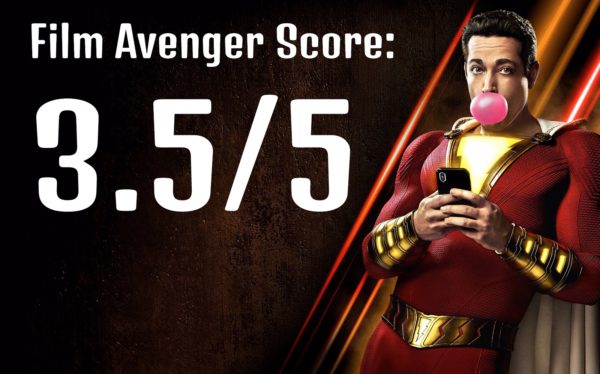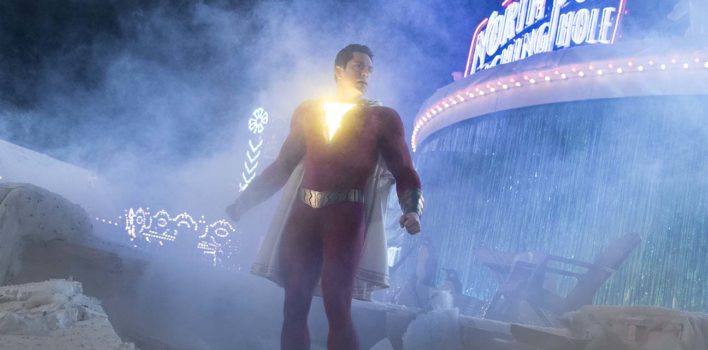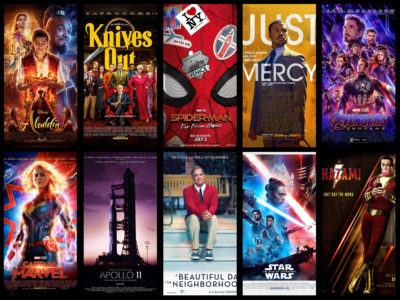Review| Shazam! – A Worthy Champion
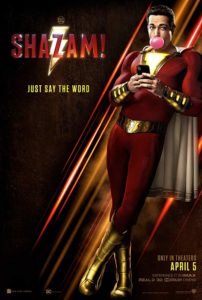 The DC Extended Universe (DCEU) has been playing catch-up to Marvel Studios pretty much since the DCEU’s inception. Man of Steel was a good, if somewhat flawed, first entry. What came next were half-baked films that had interesting concepts but poor execution (Batman v Superman: Dawn of Justice), just plain stinkers (Suicide Squad), and stylistically schizophrenic messes (Justice League).
The DC Extended Universe (DCEU) has been playing catch-up to Marvel Studios pretty much since the DCEU’s inception. Man of Steel was a good, if somewhat flawed, first entry. What came next were half-baked films that had interesting concepts but poor execution (Batman v Superman: Dawn of Justice), just plain stinkers (Suicide Squad), and stylistically schizophrenic messes (Justice League).
There have been enjoyable and fun films in the DCEU (Wonder Woman and Aquaman), but they still are in the minority. And now it seems that Warner Bros. and DC are attempting a new strategy to downplay the “shared universe” aspect of the franchise – which could be good or bad, but generally frustrating for a continuity nerd like myself.
Shazam!, the newest film in the DCEU, was definitely on par with the two enjoyable DCEU films. It’s a fun story full of youthful exuberance and wonder, with a charismatic lead, an intriguing concept, and some really entertaining set pieces.
One cannot help but compare Shazam! to the MCU’s latest entry, Captain Marvel. They were released within a month of each other and both titular characters have historically held the title “Captain Marvel” (Shazam was originally called Captain Marvel when the character debuted in 1939, but decades worth of legal challenges now prevent DC from using the name). But if there’s one hero truly worthy of that moniker, it is definitely Billy Batson – a more interesting character who actually changed, matured, took time to develop his powers, all of which made his journey interesting.
Shazam! was also one of the most spiritually poignant DCEU movies, with lots of subtle and blatant theological references peppered throughout the narrative and the main character’s DNA. It made Billy Batson’s journey similar to that of many biblical heroes.
*SPOILERS AHEAD!*
The Good: A Fun DCEU Movie
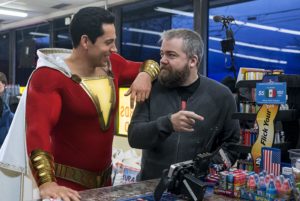 Shazam! is definitely a step in the right direction for the DCEU. Like the best MCU films, it’s a movie that has its own voice but is still tied to the overall universe and continuity of the previous films. Director David F. Samberg struck a great balance, with cool winks and nods to the other characters – my favorites being the Batarang recovered by Billy’s superhero-obsessed foster brother and Superman’s split-second cameo. Given Shazam‘s success at the box office, I suggest the “creative executives” at Warner Bros. and DC take note.
Shazam! is definitely a step in the right direction for the DCEU. Like the best MCU films, it’s a movie that has its own voice but is still tied to the overall universe and continuity of the previous films. Director David F. Samberg struck a great balance, with cool winks and nods to the other characters – my favorites being the Batarang recovered by Billy’s superhero-obsessed foster brother and Superman’s split-second cameo. Given Shazam‘s success at the box office, I suggest the “creative executives” at Warner Bros. and DC take note.
The character Shazam has always been one of the more ridiculous superheroes, and I never really thought it would work in live action. The character seemed too corny or cheesy (like a Saturday afternoon special come to life), even for me. But the movie had a lot of fun with the whole concept, made it work well, and fully embraced the ridiculousness in a tongue-in-cheek, lighthearted way that was neither campy nor farcical. Samberg clearly took the Richard Donner Superman route and maintained a degree of verisimilitude. He grounded the character in a defined reality and there were stakes and potent threats to be fought.
Shazam! had a youthful spirit that made me laugh with delight in several scenes. It reminded me of the feeling I have watching films like The Goonies – in which a kid or group of kids discover something extraordinary which takes them on a fun adventure full of great comedy and heart. The power test scenes were the penultimate example of this spirit, with the two boys testing the limits of the Shazam persona in YouTube-style videos. It was hilarious because I could see myself doing the same thing as a 15-year-old.
All of the performers in Shazam! were great, even the muted Mark Strong, who always brings the goods, as the heavy, Dr. Sivana. But the MVPs of Shazam are definitely Asher Angel and Zachary Levi as Billy Batson and his superhero persona, respectively. Billy the character never got lost in the transformation between the two. It was as if the Shazam visage enabled Billy to shed his mopey demeanor and truly be himself, albeit still painfully awkward. It was still Billy, which made it great.
One could tell that Zachary Levi was having so much fun being a dorky teenager as a superhero; the cognitive disconnect between the physique and his demeanor was charming and hilarious.
The Bad: Convenience and Contrivance
 One thing that brings me out of a story without fail is a lack of consistency in the rules of the world and Shazam! had a few large inconsistencies in its setup, particularly when it came to the parameters of the powers granted to Billy Batson. The power limitations seemed rather fungible, which led to frustrating applications that seemed more for convenience.
One thing that brings me out of a story without fail is a lack of consistency in the rules of the world and Shazam! had a few large inconsistencies in its setup, particularly when it came to the parameters of the powers granted to Billy Batson. The power limitations seemed rather fungible, which led to frustrating applications that seemed more for convenience.
The Shazam Family, while great in concept and derived directly from the New 52 version of the character’s story, was a victim of the fungible power setup. When Billy was given the power by the wizard Shazam, the wizard turned to dust, which implied that the power was transferred from person to person and could not be retained by the giver. This was also consistent with the villain’s threat of transferring Shazam’s power to himself. But when Billy’s brothers and sisters had the power transferred to them, Billy still retained his full set of powers.
The family dynamic also begged another question: if Billy was the only one, according to the wizard Shazam, who was worthy enough to wield the power, why did it transfer to the other kids? Were they worthy? Why didn’t Shazam pick any of them? It sort of lessened the special qualities Billy supposedly possessed. I thought it was ncie to see them all with powers. I just wish it was better explained.
Billy’s foster siblings also took to their powers much too quickly without a lot of struggle. It took Billy at least a few days to both discover and master his powers while fighting a very powerful villain. Yet the rest of the family took minutes to both discover and competently use their powers. That and the Seven Sins all of a sudden couldn’t turn to smoke so that the Shazam siblings could defeat them.
On the stylistic side, there were way too many slow-motion shots that held on longer than necessary. It seems to be an industry standard in the action genre, but it should be used sparingly. Otherwise, it’s just a stylistic cover for lack of story and compelling characters. In the case of Shazam!, it gave me a chance to really study the visual effects shots, some of which looked really bad and fake in slow-mo.
Being Worthy of Power
 Shazam, or the original Captain Marvel, does have the spirit of a bygone era about him in both his dress and persona. It’s the wish fulfillment of any young boy to become a hero and save the day. Boys want to be Superman and Shazam gave them the path to be their own hero. And so Shazam had an opportunity, more than any other superhero, to really influence how kids, specifically young boys, acted. If they could be “pure of heart,” maybe they could be chosen by the wizard.
Shazam, or the original Captain Marvel, does have the spirit of a bygone era about him in both his dress and persona. It’s the wish fulfillment of any young boy to become a hero and save the day. Boys want to be Superman and Shazam gave them the path to be their own hero. And so Shazam had an opportunity, more than any other superhero, to really influence how kids, specifically young boys, acted. If they could be “pure of heart,” maybe they could be chosen by the wizard.
Because of the morality of the day that the character personified, Shazam! has a lot of biblical allegory and metaphor wrapped up in the hero’s white and gold cape. Some of it is pretty blatant, like fighting literal personifications of the seven deadly sins (yes, that was in the comics) or the fact that the word “Shazam” is partly derived from a biblical character (each letter of the word represents a different elder from whom the champion’s power is derived – “s” is for King Solomon and his wisdom). Other biblical truths are built into the metanarrative of the story and, like his compatriot Superman, is part of the character’s DNA.
At its core, Shazam! was a story about power and the awesome responsibility one has when wielding it. Stan Lee wouldn’t coin the iconic phrase for Spider-Man until two decades after Billy Batson personified it.
 One of the reasons I found the film so charming is because it actually showed what the typical teenage boy would actually do with superpowers: blow stuff up, impress girls, make money, steal stuff, etc. But Billy learned in the course of the film that having power means feeling a responsibility to use the power for good.
One of the reasons I found the film so charming is because it actually showed what the typical teenage boy would actually do with superpowers: blow stuff up, impress girls, make money, steal stuff, etc. But Billy learned in the course of the film that having power means feeling a responsibility to use the power for good.
Billy Batson and Dr. Sivana, the protagonist and antagonist of Shazam!, were two equal but opposite sides of this power parable. Sivana craved the power to fuel his revenge and envy – giving in to the Seven Sins’ promises and becoming literally powered by the sin demons. Billy was initially reluctant to use the power, even fearful, but learns to wield it and grew as a person because of it.
“All this I will give You…if You will bow down and worship me.” Matthew 4:9
In life, we are indeed tempted to use our power and talent irresponsibly. Satan and his demons attempt to lure us with promises of material satisfaction. Even Jesus was tempted by Satan in the desert with promises of power and material wealth if He just gave in to Satan’s sinful demands. He saw through Satan’s lies and remained as He was, even to death on the cross.
“Billy Batson…I choose you as champion.”
 The wizard Shazam chose Billy as his champion because of Billy’s pure heart – displayed by his willingness to save his foster brother Freddie from two bullies. Billy initially rebuked the offer, saying that there are no truly “worthy people” who are pure of heart. Sivana echoed this sentiment when he released the Seven Sins from Shazam’s lair.
The wizard Shazam chose Billy as his champion because of Billy’s pure heart – displayed by his willingness to save his foster brother Freddie from two bullies. Billy initially rebuked the offer, saying that there are no truly “worthy people” who are pure of heart. Sivana echoed this sentiment when he released the Seven Sins from Shazam’s lair.
And both Billy and Sivana were right. There are no truly “worthy” people.
“There is no one righteous, not even one; there is no one who understands; there is no one who seeks God. All have turned away, they have together become worthless; there is no one who does good, not even one.” Romans 3:10-12
Try as we might, none of us are worthy of God’s favor and power because we have all sinned – every one of us. As the apostle Paul pointed out in the Book of Romans, quoting the Psalms, there is no one righteous enough on this earth.
However, because He loves us and created us, God sees past our flaws and sins and into the heart of every person. He deems us worthy to be in His presence through His unending grace – a grace that culminated in Jesus’ death on the cross. Though God’s sacrifice of His Son, we are indeed worthy. There is a pattern throughout Scripture of God using purportedly unworthy people to be his champions and achieve His goals, entrusting them with His power for His glory.
“But Moses said, ‘Pardon your servant, Lord. Please send someone else.'” Exodus 4:13
 In the Old Testament, for example, there was Moses, who thought himself unworthy of the assignment given to him by God on Mount Sinai. He gave quite a few reasons as to why he was not the right person to lead God’s people out of the bondage of Egypt, including that he wasn’t an eloquent speaker. But God still gave Moses the task because He knew Moses’ heart and entrusted him with His power.
In the Old Testament, for example, there was Moses, who thought himself unworthy of the assignment given to him by God on Mount Sinai. He gave quite a few reasons as to why he was not the right person to lead God’s people out of the bondage of Egypt, including that he wasn’t an eloquent speaker. But God still gave Moses the task because He knew Moses’ heart and entrusted him with His power.
In the New Testament, Jesus’ disciples were given power by the Holy Spirit to perform miracles like healing the sick. But these men didn’t fit the classic definition of “pure of heart” and “righteous.” One was a tax collector, one of the most reviled professions in that time. Others were filled with doubt, cowards, prone to violence – not really markings of the term “worthy.”
But what Jesus saw in these twelve men was their faithful spirit in the core of their being. He saw what was really inside them – the worth and righteousness that God placed in their hearts that has been sullied by sin. Jesus asked them to follow Him and they did so without hesitation. Jesus knew that they could spread His gospel.
With Jesus’ death on the cross and resurrection, we have all become worthy in God’s eyes. He has looked past our flaws and is bringing the person He created us to be into the light. All we must do is accept the grace given to us with humility and unending gratitude and look to God to empower us to do His work.
The Last Word
Shazam! was a step in the right direction for the DC Extended Universe. It was a fun, youthful romp into the world of superheroes. I’m definitely looking forward to a second installment, especially if it means the appearance of Black Adam, as portrayed by Dwayne Johnson!
It is true that we are not worthy to wield power, for no person is pure of heart. But because of God’s sacrifice on the cross, He has made us worthy to stand in His presence and use our power for His glory. And we must use that power responsibly and with humility. Only then can we fully understand what a wonderful God we serve.
